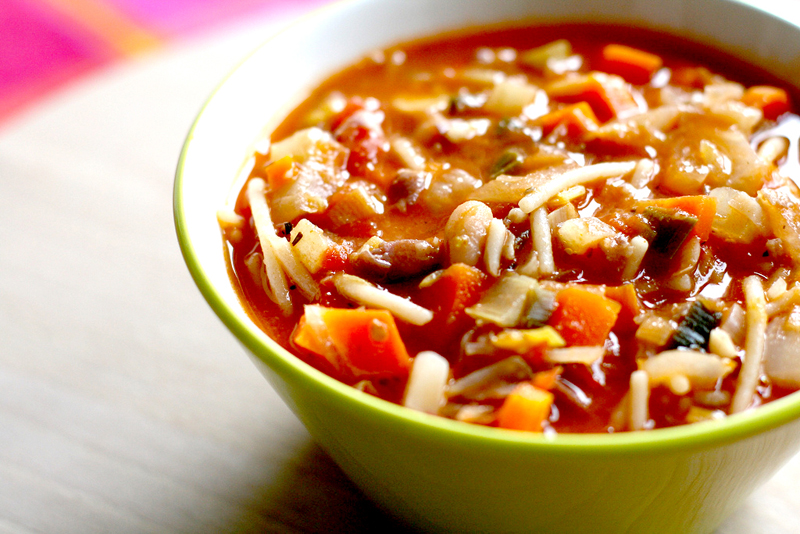Ayurvedic Tips for a Healthy Winter Diet and Lifestyle
When following an Ayurvedic diet, it is important to eat according to season. Remember that an Ayurvedic diet involves balancing the elements in the body. Different elements become more prominent in the body during various seasons (fire in summer, air in autumn and winter, and earth/water in spring), and we should eat accordingly. During the winter season, the cold and wind aggravate vata (air and ether elements) in the body. A winter diet should thus serve to reduce aggravation of vata. If an element becomes overly aggravated within you, it relocates to a particular area in the body, remains, spreads, and disease follows. Eating and acting to balance an element before it spreads through the body is essential in the prevention of certain diseases. Following is a guideline of which foods and lifestyle practices can serve to reduce air/ether in the body, and to heat the body. Always check with an Ayurvedic practitioner about which foods are best for your particular body type. The following examples serve only as a general guide for Ayurvedic winter eating, based on reducing and balancing vata.
Sweet, sour, and salty foods pacify the air element in the body, as do heavy grains such as oats, rice, and wheat. Large amounts of all dairy products except cheese are helpful in reducing vata. Mung beans, tofu, and kidney, and navy beans are also beneficial. Large amounts of almonds, cashews, pecans, sesame seeds, and coconut are warming in the winter, while fruit should be taken in only small amounts when vata is high, as their light qualities only increase the air/ether in the body. Raw vegetables should be eaten in moderation or completely avoided in people with too much vata or during the winter season, as their cold and light nature further aggravates the cold we feel in the winter. Warm, cooked, earthy vegetables such as potatoes, carrots, beets, and yams, are most soothing for vata. Warm, heavy oils such as sesame, flaxseed, and almond oils help keep the air element in check. The best sweeteners for balancing vata are jaggary, sucanet, molasses and honey. All sugars should be taken in moderation however, for optimal health. Certain spices can also keep us warm during the winter. Try adding some cinnamon, cardamom, and cloves to hot milk at night for a warming, ideal winter treat that promotes rest and well-being.
In general, winter is a time for hot tea, warm soups, oatmeal, and other heavy, warm, moist foods. Salads and dry toast can wait until another season. If you find yourself wanting to eat more during the winter, do not be alarmed. The body is designed to put on a few extra pounds in the winter to help keep us warm. As daylight grows shorter in winter, your body might also crave more rest. Instead of turning to caffeine to fight off your tiredness, listen to and respect your body’s desire for extra rest. Winter is an ideal time to turn inward – to reflect, study, meditate, and introspect. The bears hibernate, and so can we (figuratively speaking). Also avoid high stress, as stress can reduce immunity which we need to fight off colds and flus.
During the winter, try to wake by seven am to experience more daylight during the short, winter days. If you suffer from seasonal depression, which is more common in people of vata nature, make an extra effort to spend time with warm, loving friends, to catch your daily dose of sunlight, and to maintain regular daily routines in regards to eating, sleeping, and working. Warm oil massage can be very soothing during the winter time. Sesame oil is particularly helpful for balancing vata, but check with your doctor which oil is best for you. You can do this self-massage (called abhyanga) in the morning, letting the oil soak in your body for at least twenty minutes before you shower. Flowing yoga poses and pranayama (breathing exercises) can also keep the body fit during the winter, and warm steam rooms are a treat to find relief from the cold, dry weather.
In sum, although we live in a fast paced culture where year round productivity and performance are expected, try to take a break to listen to and respect your body’s requests during this winter season. Eat warm, heavy, nourishing foods, follow a regular schedule, take time to rest and introspect, and enjoy the company of your loved ones around a fireplace on a cold winter’s night.
To order ayurvedic massage oils and other products, visit www.banyanbotanicals.com but do check with an ayurvedic practitioner about which products are best for your unique, God-given body type.
Spices for Keeping Warm in the Winter
- Cinnamon
- Turmeric
- Cloves
- Black Pepper
Spices for Destroying Mucus, Sore Throat, and Runny Nose
- Honey
- Cinnamon
- Cardamom
- Black Pepper
- Ginger
Sweet Carrot Halavah Recipe
Serves 6.
Taken from ayurvedicyogi.com
Carrots are a nutritious vegetable, rich in Vitamin A. They heat the body and can help keep us warm in winter. Carrots purify the blood and tone the kidneys. The following is a recipe for a warming winter pudding, which is pleasing for the mind. This recipe is balancing for all doshas but Kapha types should eat in moderation.
Ingredients:
1 pinch saffron
1 tbsp water
2 cups of organic carrots (very finely grated)
6 tbsps ghee (found at Indian spice stores)
or organic butter
1 cup of milk (cow, goat, almond, rice or soy)
1/3 cup sweetener such as agave syrup or sugar
1/2 tsp ground cardamom
1 tbsp sliced almonds
To make: Soak the saffron in 1 tbsp water for 10 minutes. Melt the ghee (or butter) in a heavy pot and add grated carrot. Cook for 5 minutes until they are slightly brown. Add milk, stirring all the time, then add the soaked saffron and other ingredients. Cook on low heat, uncovered until all liquid absorbs (about 15 minutes). Keep stirring or it will stick! Offer the pudding in love and devotion to the Supreme. Serve in small dishes. You can also make this with other vegetables such as sweet potato, or add dried coconut, raisins, dates etc.





